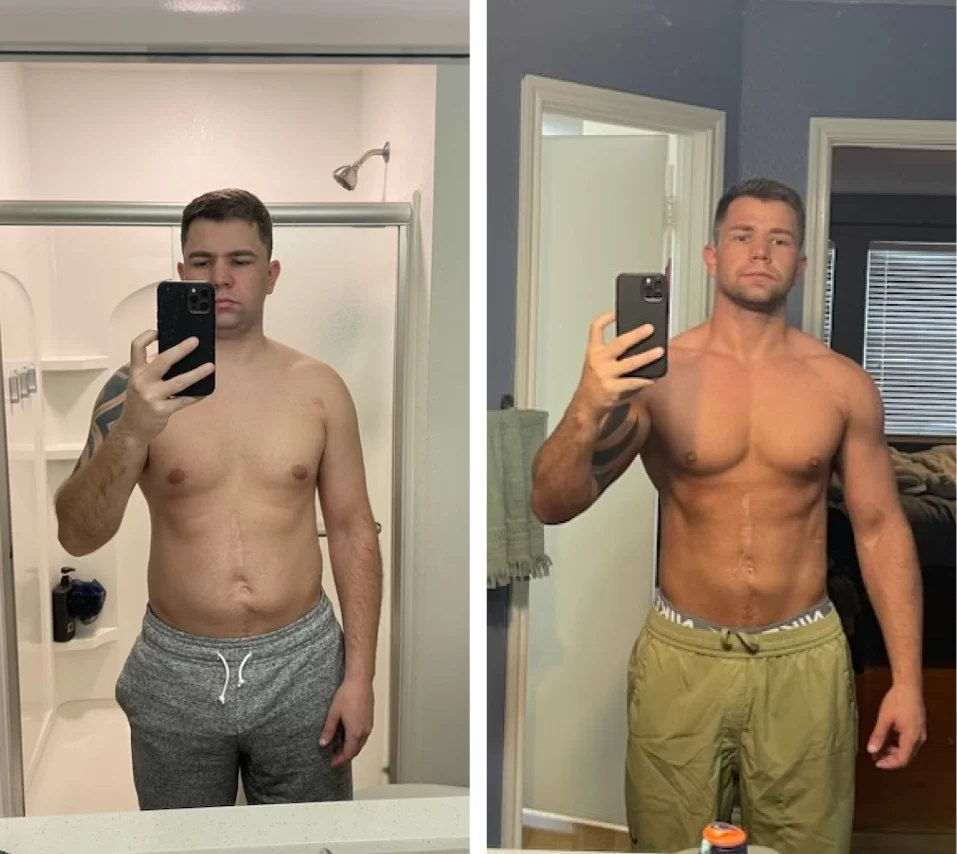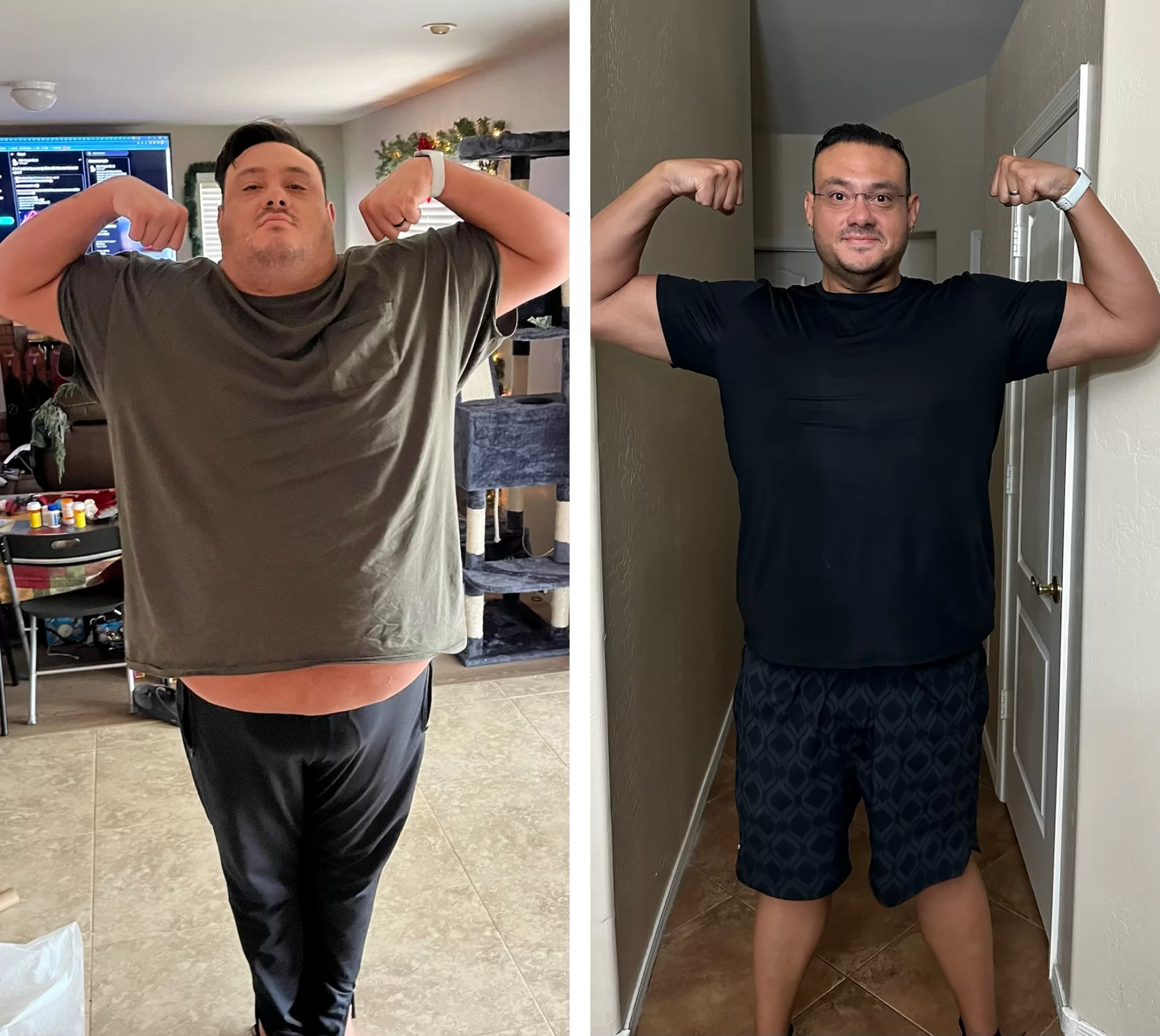- What Is Intermittent Fasting?
- Is There a Link Between Intermittent Fasting and Testosterone?
- Does Intermittent Fasting Increase Testosterone?
- How Does Intermittent Fasting Affect Other Hormones?
- Are There Proven Benefits to Intermittent Fasting?
- Can I Take Supplements While Fasting?
- Where Can I Get Help With My Diet To Increase Testosterone?
If you’re looking for natural ways to increase your testosterone, changing your diet should be one of the first things on your list of options to try, especially if you’re struggling with extra body fat. In fact, excess weight gain and obesity are two of the most common causes of low testosterone, so achieving a healthy amount of weight loss can do wonders for your health, which, of course, can significantly elevate your T levels.
Of course, how you choose to diet will also play a critical role in your success. In order for a diet to work effectively for weight loss and increased testosterone production, the body needs to burn more calories than it stores for energy, producing what we like to call a caloric deficit. Simply put, this just means that you’re consuming fewer calories than your body uses on a regular basis to stay at its current weight. Among all of the dieting trends, there are several types of diets that can help you achieve this, but for many people looking to improve their health, fasting diets–which involve avoiding regular food consumption for an extended period of time–have become the most popular method for lowering calorie intake.
Over the past few years, one such diet–intermittent fasting–has been widely seen in the health and fitness community as one of the best fasting methods to increase one’s testosterone levels. However, it’s important to note that a fast requires careful planning and a certain level of discipline, so if you choose to utilize this diet method in hopes of boosting your testosterone, it’s good to understand exactly how intermittent fasting can affect your body and increase testosterone production before you get started.
In this blog, we’ll take a look at how intermittent fasting works, the various techniques of the popular fasting diet, and other things you may need to know before utilizing it as part of your weekly routine.
What Is Intermittent Fasting?
Intermittent fasting is a dietary method that cycles your eating patterns between fasting and controlled food consumption. This is usually set to a particular schedule, where you can choose to fast for a period of time, either once every day or several times throughout the week. There are various approaches to intermittent fasting, but the most popular include:
The 5:2 Method–With this method, you maintain your normal eating schedule for five days out of the week. Then you restrict yourself to one 500-600 calorie meal once every 24 hours for the remaining two days.
So, for example, you may choose Wednesday and Friday as your one-meal days and continue to eat normally every other day for the rest of the week.
The Alternate-Day Fast–During this fasting approach, you will eat normally one day and then fast for the entirety of the next day, continuing this approach in an off-and-on pattern throughout the week. Even though this method usually involves complete fasting, some dieters may incorporate a bit of the 5:2 method and eat a small 500-calorie meal during their chosen fasting period.
The 16:8 Fast–Also known as time-restricted fasting, this type of fast requires people to skip breakfast and normally eat for eight hours each day, usually between the hours of 1:00 and 9:00 p.m. You’ll then fast for the remaining 16 hours in between each day until your next eating period.
Eat-Stop-Eat Method–For this method, you’ll fast for the full 24 hours for only one or two days out of the week. So if you ate today at 12:30, you should avoid eating again until the same time on the next day. However, you can still have calorie-free drinks-such as unsweetened black coffee, water, or tea-to keep your body hydrated during fasting.
The Warrior Diet–Now, this form of fasting can be pretty extreme and challenging for first-timers, so it’s usually best practiced by dieters already experienced in intermittent fasting. With the Warrior Diet, you fast for 20 hours–only eating raw vegetables and fruit once or twice during the day before eating a bigger meal later that evening within the remaining four-hour period.
Is There a Link Between Intermittent Fasting and Testosterone?
Although the connection is still up for debate, many researchers believe that there is a strong link between intermittent fasting and the male hormone. In many cases, this theory is primarily based on how intermittent fasting can affect calorie intake and weight loss and improve other areas of the body, which may, in turn, can have an effect on your testosterone.
Does Intermittent Fasting Increase Testosterone?
Yes, based on various studies, there are various ways intermittent fasting may increase testosterone. But once again, this is more of an indirect process. For example, research shows that building muscle mass and reducing body fat is positively associated with improved testosterone levels. In a nutshell, when you stimulate increased muscle growth and weight loss, the metabolic effects of this process can cause your testosterone levels to spike. When intermittent fasting is practiced correctly and combined with a low-calorie diet and physical exercise, it significantly lowers your calorie intake and makes it easier to lose weight as you stimulate muscle growth through regular fitness training, which may help to increase your testosterone levels.
Intermittent fasting can also help mitigate many other factors that can inhibit testosterone production or lower your testosterone levels, including:
Chronic Inflammation
There are many studies that reveal that chronic inflammation can have a negative effect on testosterone, especially for obese patients. One 2018 study published in the American Journal of Physiology reported that chronic or acute inflammatory conditions–such as sepsis, burns, or autoimmune diseases–can impair Leydig cell function and reduce testosterone production, leading to testosterone deficiency. Another downside of chronic inflammation is that the condition can also lead to elevated cortisol production, which is also associated with low testosterone levels.
However, studies reveal that intermittent fasting can significantly reduce chronic inflammation by suppressing pro-inflammatory cytokine expression and decreasing body fat, which, in turn, can also lower cortisol levels. Thus, by reducing inflammation and keeping your cortisol at low levels, intermittent fasting can indirectly help to increase your testosterone.
Oxidative Stress
Oxidative stress is another factor that may cause testosterone levels to decline. This condition is usually caused by an increase of free radicals–extremely unstable and toxic atoms or molecules that typically cause illness, damage cells, and accelerate aging–inside the body. As a result, oxidative stress can lead to various diseases that can also increase inflammation, thus, reducing your testosterone.
Studies show that intermittent fasting can work as an effective preventative measure against markers of oxidative stress. Intermittent fasting also reduces calorie intake and preserves caloric deficit, which has also been shown to lower oxidative stress.
Intermittent Fasting and The Luteinizing Hormone
Just as it helps to inhibit certain factors that may lower your testosterone, intermittent fasting can also improve the function of particular hormones responsible for testosterone release.
For example, the luteinizing hormone (LH) plays a crucial role in testosterone production, as it stimulates the Leydig cells in the testicles to produce and release testosterone in the body. As such, the regular regulation of LH can be extremely helpful in maintaining or elevating your testosterone levels. And intermittent fasting can help enhance that process.
A 1989 study published in the National Library of Medicine revealed that short periods of intermittent fasting could increase LH activity by 67% and post-testosterone response by 180%, proving that the fasting method can indirectly have positive effects on testosterone by improving the actions of hormones related to its production.
Besides affecting these factors, intermittent fasting can also affect other hormones that may help to increase your testosterone levels, which we will discuss next.
How Does Intermittent Fasting Affect Other Hormones?
Aside from the luteinizing hormone, intermittent fasting can also help to improve the production and activity of several other hormones that may affect testosterone production, including:
Human Growth Hormone
Human growth hormone (HGH) and testosterone are very closely related in terms of their production and their effects on the male anatomy. Growth hormone also acts as gonadotropin to stimulate testosterone release from the Leydig cells. So, naturally, that means when growth hormone activity increases inside the body, the more testosterone your body is likely to produce. Studies show that short 24-hour intermittent fasts can help increase HGH production by 2000%, which, of course, can stimulate a significant increase in your testosterone levels.
Insulin
The insulin hormone has one of the most essential responsibilities in human anatomy, as it primarily regulates the extraction of glucose from the carbohydrates we consume and how it is used as energy or stored for later use.
When you first wake up in the morning, your body’s circadian rhythms can cause your cortisol levels to spike naturally, which can lead to increased insulin production and cause your blood glucose levels to decline. Normally, low blood sugar levels would be a good thing, but in this instance, there can be a downside: you’re now much hungrier than usual. That can cause you to eat more for breakfast and take in additional calories that may not only increase your chances of weight gain but also work as a double-edged sword for your glucose and instead elevate your blood sugar. This is why dieters who practice intermittent fasting tend to skip breakfast to avoid this exact complication.
The elevated blood sugar levels can then lead to decreased insulin sensitivity–the measure of how much insulin is needed to regulate a certain amount of glucose in the body. When your insulin sensitivity is low, it becomes more difficult for your body to appropriately respond to insulin release. Because of this insulin resistance, more insulin is required to extract the same amount of glucose, which can later lead to medical complications such as Type 2 diabetes that can also decrease your testosterone levels.
However, intermittent fasting can help improve your insulin sensitivity. Research shows that a short-term fast for 20 hours can significantly reduce your insulin levels and cause a drop in blood sugar, making it easier to lose weight and transfer the glucose from the foods you consume into muscle tissue instead of being stored as fat.
Leptin
Leptin, sometimes referred to as the satiety hormone, is largely responsible for making you feel full after meals. It is secreted from the fat cells in the stomach to send signals to the brain that food consumption is no longer necessary. Typically, as your body fat increases, so do your leptin levels, prompting the brain to send signals that instruct the body to stop eating. However, increased body fat can also lead to leptin resistance, causing the brain to ignore high leptin levels and continue sending signals that you’re still hungry, which can leave you vulnerable to food cravings that cause you to eat more.
Intermittent fasting helps reduce leptin resistance and, thus, improves leptin sensitivity, prompting the brain to suppress food cravings. As a result, it becomes easier to lose weight, which, in turn, helps to increase your testosterone levels.
Ghrelin
The same way leptin is released from the stomach’s fat cells to stimulate sensations of fullness, the ghrelin hormone is secreted from the stomach lining to promote hunger and increased appetite. As your ghrelin levels increase, you become hungrier and more likely to succumb to the intense food cravings that eventually lead to overeating.
Studies show that intermittent fasting can reduce ghrelin levels and help to suppress appetite, making it easier to commit to a diet and avoid unnecessary eating, therefore helping you to lose weight. This allows you to maintain a healthy body fat composition, thus, indirectly boosting your testosterone levels.
Adiponectin
Then, there’s adiponectin. Similar to leptin, the adiponectin hormone is released from fat cells to regulate metabolic effects such as insulin sensitivity in the pancreas and various muscle groups. This helps to improve your cells’ ability to absorb glucose and reduces blood sugar levels, which once again helps you to lose weight and increase your testosterone. Intermittent fasting has been shown to increase adiponectin activity, which helps to improve insulin sensitivity, thus encouraging amplified testosterone production.

Are There Proven Benefits to Intermittent Fasting?
Aside from helping you lose weight and increasing your testosterone, there are many other health benefits to intermittent fasting. Since fasting helps to reduce our calorie intake, blood sugar, and insulin levels, it can provide a preventative measure against Type 2 diabetes. Moreover, the dietary method has been proven to elevate HGH levels, which can help reduce the chance of muscle breakdown from caloric restriction and improve muscle growth.
Intermittent fasting also helps improve your heart rate and blood pressure, reducing the risk of heart disease. Research also suggests that due to its anti-inflammatory effects, intermittent fasting may help improve many medical conditions associated with inflammation, such as multiple sclerosis, stroke, asthma, arthritis, and Alzheimer’s.
But that’s not all. Studies also reveal that as you fast, your body has a much easier time removing harmful proteins from your cells, allowing for improved cellular and tissue function. In addition, people that practice intermittent fasting have been able to experience improved memory retention, concentration, and overall cognitive performance
Can I Take Supplements While Fasting?
Generally, it is typically safe to take vitamin supplements while fasting, but you still need to exercise caution with using certain supplement products for your fasting experience to be optimal. For example, certain types of magnesium, which can be difficult to attain through regular dieting or food consumption, can be taken during fasting or eating periods. However, since magnesium may cause diarrhea, it is usually recommended that you take the supplement with certain foods to reduce the chance of experiencing the side effect. You’ll need to remain mindful of what you eat along with a magnesium supplement and only consume foods low in calories and sugar during the fasting period; otherwise, you risk breaking your fast.
On the other hand, supplements such as vitamin gummies, protein powder, and chewable tablets usually contain sugars and calories that can trigger an insulin response and also break your fast, so it’s best to take these during your eating period. Fat-soluble supplements such as the vitamins D, A, or E are best absorbed with a meal containing oils and fats, so avoid taking these during your fasting period and only use them when you resume your normal eating schedule. Mineral supplements such as iron, zinc, and potassium can upset your stomach if taken while fasting, so you should also save these supplements for your eating window.
Where Can I Get Help With My Diet To Increase Testosterone?
Whenever you’re trying different diets to increase your testosterone, it’s best to work under the guidance of experienced hormone specialists at a reputable Low T clinic like the staff at Renew Vitality. Our seasoned physicians and wellness experts can study your physiology and help you determine which dietary methods would be the best option to help naturally elevate your body’s testosterone production.
We also provide fitness plans that are customized to work with your diet so you can truly maximize the effects of the approach and achieve an optimal increase in your testosterone levels. If fitness and dieting aren’t enough to help you achieve your goals, we also offer effective hormone treatments that can help compensate for your diminished testosterone, so you can fully maximize the effects of a healthier lifestyle to improve your overall wellness.
Contact us at 1-866-995-2371 and schedule a consultation with one of our specialists to learn more about how the treatment options at Renew Vitality can help you optimize your testosterone and keep your body healthy and maintained for years to come.
References:
- https://pubmed.ncbi.nlm.nih.gov/23244540/
- https://pubmed.ncbi.nlm.nih.gov/2686332/
- https://www.ncbi.nlm.nih.gov/pmc/articles/PMC329619/?page=6
- https://pubmed.ncbi.nlm.nih.gov/16051710/
- https://www.consumerlab.com/answers/supplements-intermittent-fasting/intermittent-fasting/
- https://eje.bioscientifica.com/view/journals/eje/157/2/1570157.xml
- https://www.nature.com/articles/ijo2017206
FAQ
Does a 12-hour fast increase testosterone?
Any intermittent fasting for up to 24 hours can help increase HGH levels and indirectly boost your testosterone significantly. Fasting for half of the time coincides with the theory that short fasts work better for elevating your testosterone
Can prolonged fasting lower testosterone?
The jury is still out on this, but it is certainly possible. Some studies show prolonged fasting may reduce follicle-stimulating hormone (FSH) and luteinizing hormone (LH) concentrations, leading to decreased testosterone levels.
Does intermittent fasting increase HGH?
Yes, it can. One study conducted on a patient who underwent a 40-day fast found that HGH levels increased by 300% after the first five days of fasting.
Does intermittent fasting work for men?
Absolutely. One study published in 2017 suggested that intermittent fasting led to greater weight loss and fat loss in men with obesity than regular calorie restriction. In a 2016 study, men who combined the 16:8 approach with resistance training for two months showed a substantial decrease in fat mass while maintaining muscle mass throughout the process. any aromatase inhibitors on the market, Arimidex is usually one of the most commonly prescribed estrogen blockers for men in TRT.




